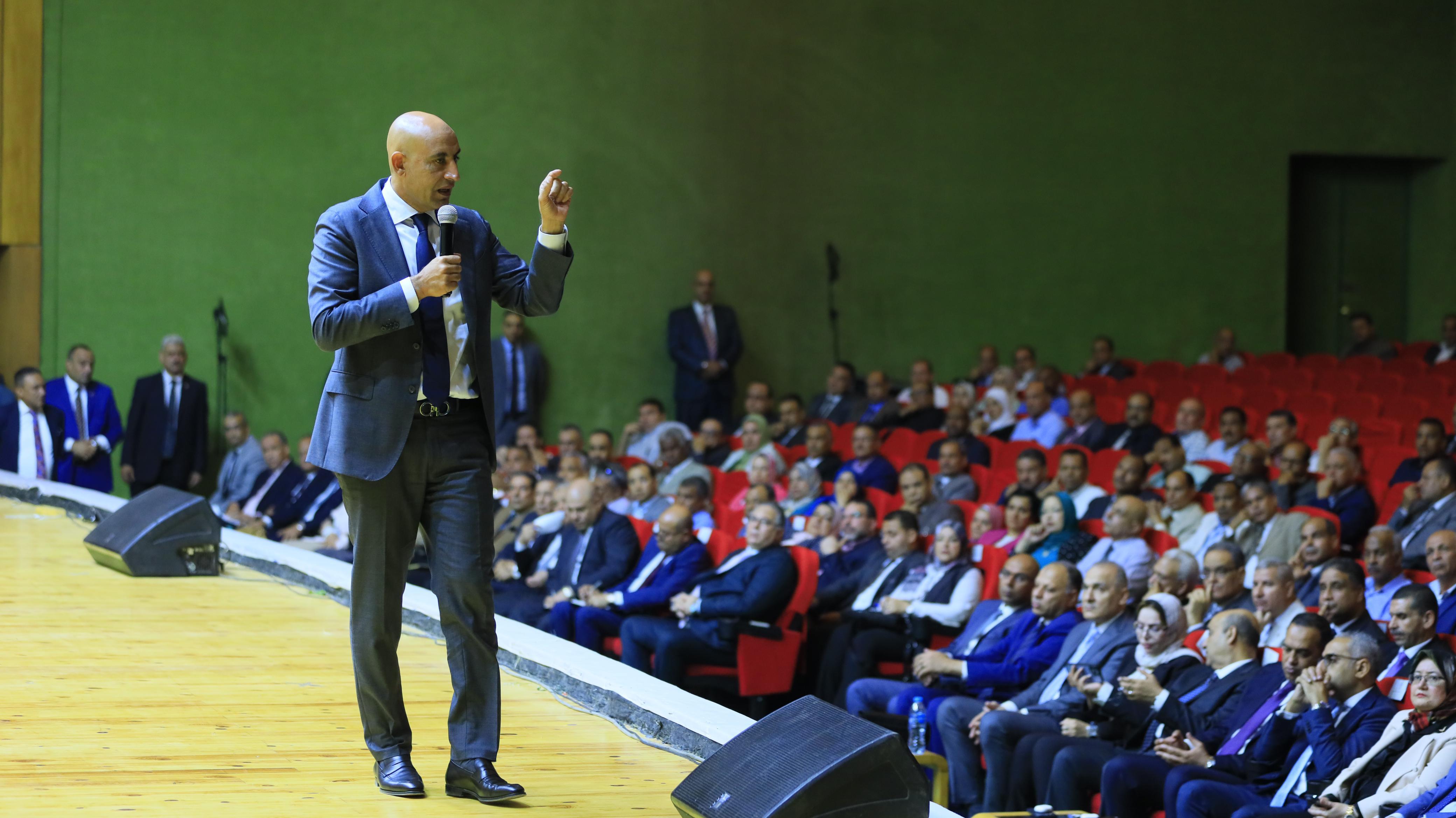The Minister of Education holds an expanded meeting with directors and deputy directors

Mr. Mohamed Abdel Latif, Minister of Education and Technical Education, held an expanded meeting with directors, deputy directors, and directors of education administrations across the country's governorates at Education City in 6th of October. This meeting reflects the Ministry's commitment to strengthening direct communication with educational leaders, monitoring the implementation of educational policies, and developing the system's performance, ensuring the quality of education and monitoring developments on the ground.
At the beginning of his speech, Minister Mohamed Abdel Latif expressed his thanks and appreciation to all directors and deputy directors of education directorates and directors of education administrations for their significant efforts in ensuring the success of the academic year, particularly in organizing the General Secondary Certificate exams. He emphasized that their commitment and responsibility have made a tangible difference in the education system, praising the good management and fruitful cooperation between field teams.
The Minister emphasized that any progress achieved in the field is directly linked to the role of directors and deputies of education departments, school principals, and teachers, as they are a key component of the success of the educational process. He added, "The future is better, and I am confident that you will succeed in the challenges ahead."
Regarding schools operating in the primary stage with a two-shift system, the Minister emphasized the importance of working to end the evening shift next academic year, noting that enrollment rates in the first grade of primary school are witnessing a clear decline due to the decline in the number of births in recent years.
The Minister indicated that a study has been prepared in cooperation with the General Authority for Educational Buildings aimed at reducing the evening shift, noting that new schools have been built to accommodate evening shift students.
The Minister also emphasized that the directors of educational departments possess the capacity and experience to develop appropriate solutions based on the circumstances of each department. He directed each director to hold meetings with the principals of their respective schools to develop a comprehensive plan to reduce evening shifts, guided by the Educational Buildings Authority's plan, to align the overall plan with the specific needs of each educational district. This will serve the interests of students without negatively impacting the quality of the educational process.
Regarding the Egyptian Baccalaureate system, Minister Mohamed Abdel Latif emphasized that the Egyptian Baccalaureate system aims to alleviate the suffering of students and parents by providing a more flexible, equitable, and multi-opportunity education system. He said, "We are not seeking to abolish high school, but rather to provide an alternative that enables students to embark on their educational journey without the fear of "one chance." We are giving our children a local educational opportunity according to international standards, and we must intensify awareness-raising efforts in all educational directorates and departments about the new system."
Minister Mohamed Abdel Latif explained the main features of the new baccalaureate system, noting that it will be implemented alongside the general secondary school system. However, the new baccalaureate system allows for multiple attempts, unlike the traditional system, which determines a student's fate based on a single attempt. The baccalaureate system allows for multiple attempts through improvement opportunities.
The Minister of Education added that the same coordination criteria applied to the general secondary school system will apply to baccalaureate students without any discrimination, whether in theoretical or practical colleges. There is no separation between the two systems upon admission to universities.
The Minister emphasized that the goal of the baccalaureate system is to "liberate students from the fate of a single opportunity," noting that the psychological pressure experienced by Egyptian students in secondary school is unparalleled in modern education systems.
The Minister explained that the new baccalaureate system ensures that students who do not have sufficient resources for private or international education will receive multiple educational and assessment opportunities of the same quality as those available in other systems.
The Minister concluded his remarks on the baccalaureate system by saying, "We are reformulating the philosophy of education and restoring to students their ability and dreams for learning. We no longer accept that a student's entire dream be tied to half a grade or a typo. He emphasized that our children's future must be built on competence, not a single opportunity."
Minister Mohamed Abdel Latif emphasized that the Ministry is working diligently to develop curricula to meet students' needs and take into account individual differences. He pointed out that recent studies have revealed a percentage of students suffering from reading difficulties and that some parts of the curricula are complex. He explained that the Ministry is working diligently to develop curricula to meet students' needs and take into account individual differences.
The Minister explained that new curricula have been prepared in cooperation with several international and Egyptian institutions, as well as national publishing houses, stressing that these new curricula are entirely national and owned exclusively by the Ministry of Education and Technical Education.
In the same context, the Minister noted the commencement of training for Arabic language teachers on the developed curricula. Training for social studies teachers will begin next week, followed by training for English language teachers. This is part of the Ministry's plan to ensure the proper implementation of the new curricula in classrooms.
During the meeting, Minister Mohamed Abdel Latif stressed the need to complete preparations for the new school year in all schools, including minor maintenance work, painting classrooms and fences, landscaping, and beautification. This will reflect a clean and safe educational environment that welcomes students and encourages them to attend school from day one.
The Minister emphasized the importance of instilling the values of discipline and positive behavior in students, directing the dissemination of clear instructions to all schools urging students to maintain the cleanliness of their school and facilities, considering them their second home.
